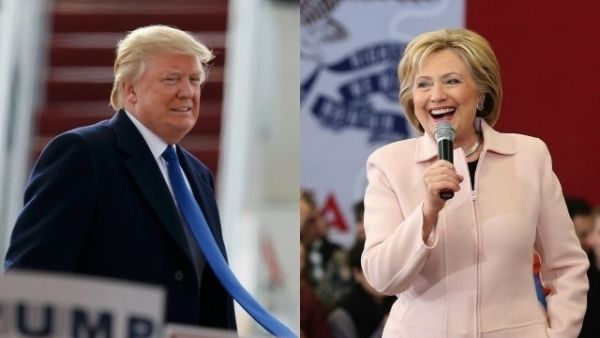The polls have officially opened in one of the most-watched elections campaigns in history, as Hillary Clinton and Donald Trump battle it out for the US presidency. And given America's affinity for meddling in the Middle East, the outcome of the election is sure to have an impact on the region. With Obama leaving behind a legacy of the highest use of drone attacks out of any US president, an intervention in Libya, and an extension of the war in Afghanistan, what’s in store next for the Arab world?
The candidates
Hillary Clinton is known for her tough stance, and she has been labelled ‘hawkish’ and ‘military driven’ in her approach to the Middle East. With her past support for the war in Iraq and intervention in Libya, it’s a fair analysis. Meanwhile, with Trump, there tends to be a rather large question mark when it comes to his foreign policy and where he stands on Middle East. However, although he has often been vague or nonsensical in his talk of foreign policy, he has also insisted on a valid point: the current US policy simply doesn't work. To find some clarity, we took a look at some of their previous foreign policy comments to determine their stance on Arab countries and issues.
Syria
Syria is now in the sixth year of a bloody civil war, with no end in sight. One of the largest issues to be addressed in the region, Hillary Clinton and Donald Trump have expressed opposing views over the best way to approach the conflict.
Clinton has called for a no-fly zone over Syria to gain leverage over the Russians, who are currently supporting Syrian President Bashar Assad and have launched a series of airstrikes in the country.
On the other hand, Trump appears to be in favor of Assad and his Russian allies, indicating he would side with them if it helped to defeat Daesh (also known as the Islamic State). "I don't like [Syrian President Bashar al-Assad] at all, but Assad is killing ISIS. Russia is killing ISIS and Iran is killing ISIS,” he said. However, this has raised controversy, given reports that Assad's regime had waged a “systematic and widespread attack against [the Syrian] civilian population.”
Iraq
While Obama intended to withdraw from Iraq, the country remains in disarray following the widely criticised 2003 invasion, with Daesh taking advantage of the chaos and in-fighting to gain a foothold in Mosul and other areas.
As early as 2002, Clinton has been in support of military intervention in Iraq, which has done little for her popularity in the Middle East. She has criticized the Iraqi national army for not doing more to secure the country and deter Daesh, and expressed praise for Kurdish forces fighting in the north.
Meanwhile, Trump has claimed he was always critical of the decision to invade Iraq in 2003, arguing that it created instability in the Middle East (however, critics have disputed Trump’s claim that he always maintained his position). While Trump hasn’t specified what he would do to improve the situation in Iraq, he has spoken frequently about working more closely with the Kurds.
Iran
The Iran deal, under the Obama administration, limited Tehran's nuclear ability in return for lifting international oil and financial sanctions. America’s relationship with Iran could go either way in the future, as seen through the two president’s differing stances on the deal.
While Clinton has been critical of the Iranian government, calling for new sanctions against the country, she was also part of the Obama administration for the setting up of the deal, and endorsed it at the time.
Meanwhile, Trump has been extremely critical,accusing the U.S. of giving Iran to access $150 billion in money that had been frozen. “We give them [Iran] $150 billion, we get nothing.” he said. He has proposed renegotiating the nuclear deal, alongside doubling and tripling the sanctions the U.S. had placed on Iran.
Israel-Palestine
Over the past eight years, Israel has launched three wars on the besieged Gaza Strip, while simultaneously accelerating its settlement programme throughout the occupied West Bank. However, both candidates have turned a blind eye, and are extremely vocal of their support for America’s “friends,” Israel, while referring to the Palestinians as “terrorists.” Whichever candidate wins, it doesn’t look good for the Occupied Palestinian Territories.
Clinton has long maintained a close relationship and unwavering support for Israel. During her speech at AIPAC, she has called for boosting U.S. support for Israeli missile-defense systems and helping Israel with technology to detect tunnels that Hamas uses to send fighters and bombers into Israel from the Gaza Strip.
Similarly, Trump has called for greater US support of Israel, describing the country as “our greatest ally in the region.” He did rile Israelis up the wrong way, however, when he suggested that he would remain neutral in any peace talks between Israeli and Palestinian leaders. However, Trump was quick to back down on these claims
Muslims
In one of the most controversial moments of the election (and there were many!) Trump called for “a total and complete shutdown of Muslims entering the United States until our country's representatives can figure out what the hell is going on.” Aside from it being logistically impossible to verify people’s religions at airports, the statement was widely condemned for being racist.
Clinton shut down Trump’s proposal, arguing that it will alienate Muslim allies in the Middle East and harm US relations, which encouraging anti-US sentiment and an increased support for Daesh. She stated that to help combat terrorism, it is necessary to build alliances with Muslim communities rather than alienate them.
So, where’s it heading?
As voters head to the ballot box, it’s predicted there will be a tight race ahead, as Donald Trump increasingly closes the gap with Hillary Clinton. However, Clinton is still widely expected to win, with the analysis website FiveThirtyEight giving her a 70 percent chance of victory. Whatever the outcome, the future for the Middle East remains uncertain, although neither option seems particularly appealing.







